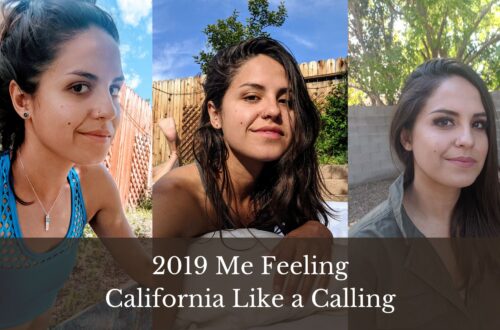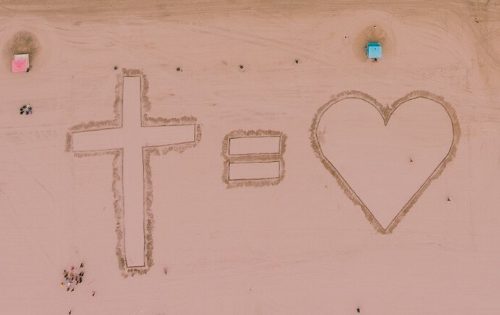
“It’s Not You, It’s Me”: How I Embrace My Demisexuality and Define It For Others
CW: sexual topics, language
I met a dude in my critical introduction to literature class—handsome, muscle-thick, his intention to pursue law, but my interest was ultimately piqued when I overheard our professor praise his first paper. (It was a difficult class and one of the most rewarding and illuminating I’ve ever taken.) We became study partners. I found out he was Mormon, recently re-converted in fact, and he found out I wasn’t—possible he’d already suspected given the way I broadcast. I declined his invite to a Mormon singles activity. We returned to studying.
Eventually our study sessions moved from the school to his apartment, and then his bedroom.
***
Hold up. I know what you’re thinking already. Ex-mo Bekah’s out to corrupt good ole Mormon boys just for the hell of it, but let me tell you right now, the few I hung out with after my divorce were horny AF and didn’t keep it a secret. And the only reason Study Sesh didn’t turn into Netflix and Chill was because of me.
Here’s how it went down:
The studying got done, but in between unpacking Saussure and Derrida, he’d challenge my loss of faith. We’d go back and forth, mostly in good spirits, and then one night he asked if he could kiss me. This was before we finally went on a date and he invited me to lay on him during a movie.
To that I gave him the look everyone should give Buff Mormon Boy when he offers up his crotch like a cushion. Then I said what everyone should say when they want to make Lounging-Like-a-French-Girl Mormon Boy blush.
“Oh, your crotch area? Yeah, I’m not gonna lay on your crotch area.”
I made him sit up and stop hogging the whole couch. But to the “kiss me” question, I said, “Eh, I have my outlets.”
“I know this will make me sound like a jerk,” he said, “but, like, I do it all the time. It doesn’t have to mean anything.”
Embracing demisexuality has helped me stop feeling defective. Calling myself bi even though I haven’t been in a committed relationship with a woman puts context to my lifelong interest in them. I seek to understand myself better so that I can better become my own protector and liberator.
This was still before I knew I was on the asexual spectrum or I might’ve said, I’m demisexual. Learn about it. But other replies might have been: Thought the atheist would be easy pickings, huh? Or, How’s that flirt-to-convert strategy working out for you?
He dropped it and I’ll give him credit for that. (Honestly. The fact that he asked first every time and respected-ish my responses should be the norm, but I’ve since learned that it isn’t.) But he’d later tell me that I just hadn’t tried hard enough to get a testimony and that was why I’d left the church. Cool, dude. That was the last time we talked, even in class, except for once when I saw him in the hall and said, “Looking swole, bro.”
But after he told me that kissing him didn’t have to mean anything, which I inherently agree with for other people if they’re into it, I said, “Yeah, I’m just not into casual stuff.”
What is demisexuality?
First off, this is a shame-free zone. I have regrets in my life, but I’ve ceased shaming myself for them. I was doing the best I could with the cards in my hand. If at any point it came off like I was shaming Mormon Boy for his sexuality, I regret that too. Boy wanted to get his rocks off and I respect that. I just wasn’t gonna be the one to do it for him. And listen, I probably would’ve given it a going-through-the-motions whirl just to see what came of it if he’d been attractive to me in any other way than physically, but in the end he just wasn’t. Harping on someone’s faith choices while piling on the hypocrisy tends to do that.
Removing shame from sexuality has allowed me to define my own in truly clarifying ways. I didn’t become familiar with the term demisexual until recent years, but learning about it has elucidated experiences from my past so well that I wish it’d been a topic of discussion in a sex education course long before I entered the dating world. Come to think of it, I wish many other things besides abstinence had been a part of my sex ed curriculum, but I digress.
Essentially, I have very little desire for casual intimacy and I especially don’t want to have sex with someone until I’ve forged a strong emotional bond with them. I need to be “in love,” or like unto it. Lacking love, infatuation might do, but we don’t need to get into the semantics of that. We can put it this way too: my libido craves emotion.
On a handful of rare occasions, I’ve experienced arousal when the emotions surrounding a semi-casual encounter were so piqued that it became almost an orgasm of the mind. What do I mean by that? Well, I’ve never been able to reanimate the sensations of making out while Mormon. Ever. It’s probably the one thing I miss about Mormonism except maybe the way a tiny piece of bread could taste during sacrament on a Fast Sunday.
The closest I’ve ever come to replicating those finite sensations was during extramarital exploration. Why? Because both were taboo, a word etymologically rooted in superstition. Because I was flirting a dangerous social line and my emotions were on high alert.
While Mormon, those make-out sessions at any point could have snowballed into the sin next to murder—fornication. While married with a conditional “hall pass,” those make-out sessions could have careened at any moment into that other sin next to murder—adultery. Dun-dun-dun. My cells were alive with the fear of it, my senses thrumming.
Demisexuality is on the asexual spectrum. Now that I’m no longer Mormon or married and shame has been all but expelled from my vocabulary, casual anything regarding sex is simply not on my radar. I could kiss Captain Marvel herself and not feel a thing in my nethers if I wasn’t in love with her, though I invite her to test me.
I’ve embraced the label because the definition and stories of people who also identify as demi resonate with me. Because prior to embracing it, I felt robbed and defective. Because through observation and experience, the people who most want to criticize or invalidate those who claim demisexuality are the ones we’re not fucking.
What demisexuality isn’t
I’ve heard demisexuality disparaged as mere prudishness, a convenient word for people who want something from another and can’t have it, and it’s demonstrably false—I have no moral scruples. After giving “casual” the old college try on several passionately one-sided and disappointing occasions, I’ve learned that I just don’t want to do anything I physically don’t want to do, and nothing is obligating me to go through the motions.
My fickle, touch-and-go sex drive really bummed me out for a while. I wanted the wanton passion of the allosexuals (people who experience sexual attraction and arousal in a “normative” way) that droned en masse to the places sex was on the menu, but it just wasn’t in me to follow through in the expected ways. Lord, how many threesomes I might have had. (I’ll never forget you, Pretty Girls 1 & 2; I wish I’d left the club with both of you when you wanted me to, but I was scared. Dancing with you was amazing but I didn’t know you and my track record strongly suggested we all would have ended up disappointed. Plus maybe you were just trying to rob me.) One of them looked just like Amanda Seyfried. God, I’d let her rob me though. #regret
Moving on.
Remember Mormon Boy? His indifference toward “meaningful” intimacy would be echoed by later assholes. According to one, I put sex on a pedestal; I made too much of it. It didn’t have to mean anything. Likely words from someone trying to fuck me, someone annoyed with my reluctance. But sometimes infatuation isn’t enough. Sometimes you have to feel safe with someone too, heard and respected.
Demisexuality isn’t prudishness. It isn’t a defect. And it certainly isn’t, for me, an inflated sense of morality. It’s simply having certain prerequisites to sexual interest and arousal that most others don’t seem to share. Go to a club or browse Tinder for ten minutes. You’ll see what I mean.
Does demisexuality belong in queer spaces?
Embracing demisexuality has helped me stop feeling defective. Calling myself bi even though I haven’t been in a committed relationship with a woman puts context to my lifelong interest in them. I seek to understand myself better so that I can better become my own protector and liberator.
Before being able to put words to my demisexuality, to explain it to myself and others, I grappled with a libido that fed almost exclusively on emotion, the more extreme the better, and I believe that set me up for accepting emotional abuse and sexual coercion. Now I know that I get to define the rules for how I’m touched and when and by whom, without having to spell out the reasons for anyone who doesn’t want to understand—a sadly belated epiphany for a girl who’d felt for decades that her life wasn’t truly hers to live.
But imposter syndrome haunts my queerness like it does my writing. Throughout my life I keep finding myself in the gray areas of everything, and there’s safety in liminality, privilege in ambiguity. For example, people usually don’t know where to place me racially when they look at me and even my claimed bi- and demisexuality put me in a position to simply disappear into heteronormative constructs in ways many queer folk can’t. I feel that this puts impetus on my role as ally, a role I want to justly fill.
Does demisexuality belong in queer spaces? That’s for the gatekeepers to decide, I suppose, but in the meantime, I’ll continue to regret that this year I am hundreds of miles away from my favorite people celebrating one of my favorite causes. Happy Pride Month, everyone! Sending you love from the gray middle of nowhere.





2 Comments
Teuila Gerber Lavea
I am so immensely proud of you, Rebekah! Your candor, your strength is a Light in a sea of darkness! For Mormons and Exmormons alike, sexuality is a kind of kryptonite, all powerful, all consuming and unfortunately, it has too often become a rusty, jagged sword the inmates use to sever off eachother’s limbs in jealous rages, as the self proclaimed victor stands atop the bloody and wounded. It takes such courage to tell the truth. It is a rare quality, a distinction of your noble heritage.
I am so honored to call you my cousin and my friend! I love you very much!
Reb
Love you too! Thank you!